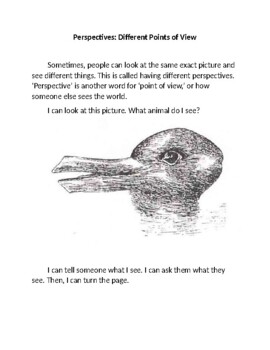Perspectives
- Word Document File
Description
This is a social narrative* about perspective-taking. It includes the difference between "black-and-white" thinking and the "gray zone". It's intended for someone with good receptive-expressive language skills who has trouble with social communication skills such as understanding that others have different thoughts and experiences.
*"Social narrative" is a similar term to Social Story (TM), a term copyrighted by Carol Gray. Social narratives are an evidence-based practice, based on Gray's research, that explains a concept or skill. They can be beneficial for students who have difficulty with understanding social expectations and others' thoughts/feelings about their behavior. Social narratives can also be used for people with anxiety who would benefit from knowing what to anticipate in a situation. They have typically been used for individuals with special needs, such as people on the Autism spectrum.




